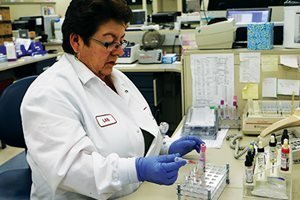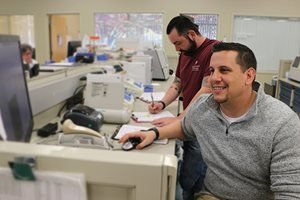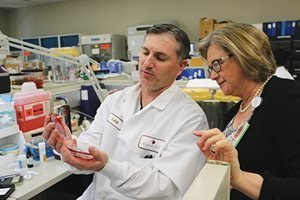Thursday, April 27, 2017, 02:32 PM
The backbone of the hospital – the laboratory
When you think of hospitals, most people think doctors or nurses, but there are many members of a patient’s healthcare team – including the laboratory specialists. These behind-the-scenes specialists are vital to top-notch patient care. Since it's Medical Laboratory Professionals week (April 23 through 29), we want to recognize these vital healthcare specialists.
When you think of hospitals, most people think doctors or nurses, but there are many members of a patient’s healthcare team – including the laboratory specialists. These behind-the-scenes specialists are vital to top-notch patient care. Since it's Medical Laboratory Professionals week (April 23 through 29), we want to recognize these vital healthcare specialists.
 |
| Clinical Lab Scientist, Yolanda Martin, working testing for blood types at Community Regional's lab. |
The lab team includes phlebotomists, clinical analysts, lab technicians, lab assistants and clinical lab scientists (CLS) just to name a few. Yolanda Martin, a CLS in the Community Regional Medical Center's Laboratory and blood bank, tests for a patient’s blood-type and performs pre-transfusion tests to make sure there are no antibodies found that could complicate a blood transfusion. A CLS like Martin are required to have a bachelor’s degree, a year of internship experience and pass the California license exam. Every two years, they must complete continuing education classes.
“Everybody works together to keep patients safe,” Martin says. “We provide what doctors request, which is such a vital role in healthcare.”
Martin says the lab atmosphere is great for teamwork: “Behind the scenes, it’s a lot of fun. When it becomes hectic, everyone comes together to make sure patient care is number one.”
 |
| Travis Stephenson and Jonathan Anderson, Clinical Analysts, monitoring the lab's computer system. |
“The lab systems are more intricate than what people give it credit for,” says Travis Stephenson, a clinical analyst who monitors the lab computer system and manages the EPIC electronic medical record’s lab functions. Stephenson, who originally started as a lab technician, continues, “we are the backbone of the hospital... we are why doctors are able to diagnose patients.”
Patricia Lockhart, lab supervisor of Specimen Collection, has known she wanted to work in a lab since junior high school. Lockhart emphasized how important the lab work is to the hospital. Nearly 70% of a patient’s chart is related to lab work, from the blood work that helps in diagnosing a patient to the tests run to monitor medication the patient is taking.
“You never know what you’re going to find as far as being able to help with diagnosing a disease,” Lockhart said. “I have phlebotomy staff who are in the emergency room. They are there with the traumas as they come in, and there’s certain things that need to be done minutes from the time the patient comes through the doors. Usually a blood draw is one of them. So my staff are right there.”
The role the lab staff play in healthcare does not go un-noticed as we recognize them for Medical Laboratory Professionals Week. Thank you for all you do to support our nurses and doctors – and care for our patients!
 Lindsay Haworth
Lindsay Haworth
Communications Intern
Corporate Communications






